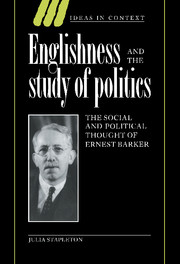Book contents
- Frontmatter
- Contents
- Acknowledgements
- Introduction: The ‘national character’ of Barker's thought
- 1 Lancashire, Idealism, and Whiggism: the making of an English political scientist
- 2 The polis, law, and the development of political studies at Oxford, 1900–1920
- 3 Society and the state in the English national past: the lure of Pluralism
- 4 Statehood, nationhood, and internationalism: English political theory and the First World War
- 5 Education and national character: the milieu of King's College London
- 6 ‘Continental’ political science and the Cambridge Chair
- 7 Traditions of civility: the construction of Englishness in the Second World War and beyond
- 8 The expansion of Englishness: the Books Commission, Europe, and the Commonwealth
- Conclusion: A late-Victorian liberal-conservative
- Select Bibliography
- Index
- Ideas in Context
4 - Statehood, nationhood, and internationalism: English political theory and the First World War
Published online by Cambridge University Press: 11 September 2009
- Frontmatter
- Contents
- Acknowledgements
- Introduction: The ‘national character’ of Barker's thought
- 1 Lancashire, Idealism, and Whiggism: the making of an English political scientist
- 2 The polis, law, and the development of political studies at Oxford, 1900–1920
- 3 Society and the state in the English national past: the lure of Pluralism
- 4 Statehood, nationhood, and internationalism: English political theory and the First World War
- 5 Education and national character: the milieu of King's College London
- 6 ‘Continental’ political science and the Cambridge Chair
- 7 Traditions of civility: the construction of Englishness in the Second World War and beyond
- 8 The expansion of Englishness: the Books Commission, Europe, and the Commonwealth
- Conclusion: A late-Victorian liberal-conservative
- Select Bibliography
- Index
- Ideas in Context
Summary
THE ISSUES OF THE WAR
By the outbreak of the First World War, then, Pluralism had served to sharpen Barker's conception of the state and to reinforce his commitment to it. No denigrator of the state, his intention in taking up Pluralist issues was to bring the state back into credit by the logic of Pluralist thought itself. At the end of his book Political Thought in England from Herbert Spencer to the Present Day (1915), he conceded the case for a new, ‘federalistic’ theory of the state to match recent developments in Irish Home Rule, Welsh disestablishment, trade-union rights following the Trades Disputes Act of 1906, and growing denominationalism in education. But he warned against undermining the state too much: ‘The State and its institutions are with us and we must make the best of them.’
Arguments in favour of the sovereign state had become especially compelling for him with the outbreak of the First World War. We have seen that ‘The discredited state’ concluded with the confident prediction that in times of crisis, the sense of citizenship would override all other loyalities and identities. This was certainly true of himself. Whatever – slight – misgivings he may have felt towards the state prior to the First World War, they quickly dissolved in the wave of patriotism which swept English public life in 1914. Even in 1916, with the introduction of conscription, he remained steadfast in his commitment to the principle of state sovereignty.
- Type
- Chapter
- Information
- Englishness and the Study of PoliticsThe Social and Political Thought of Ernest Barker, pp. 92 - 110Publisher: Cambridge University PressPrint publication year: 1994



